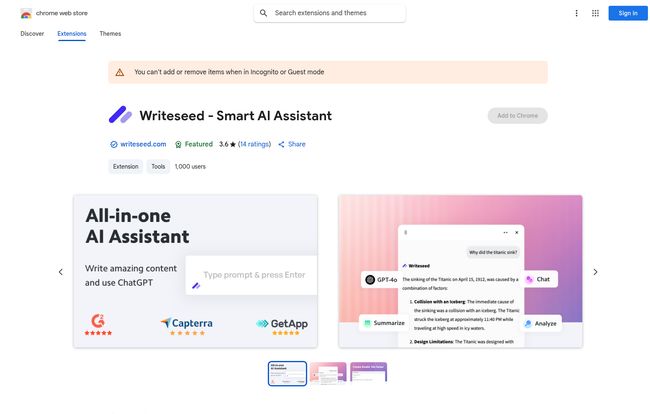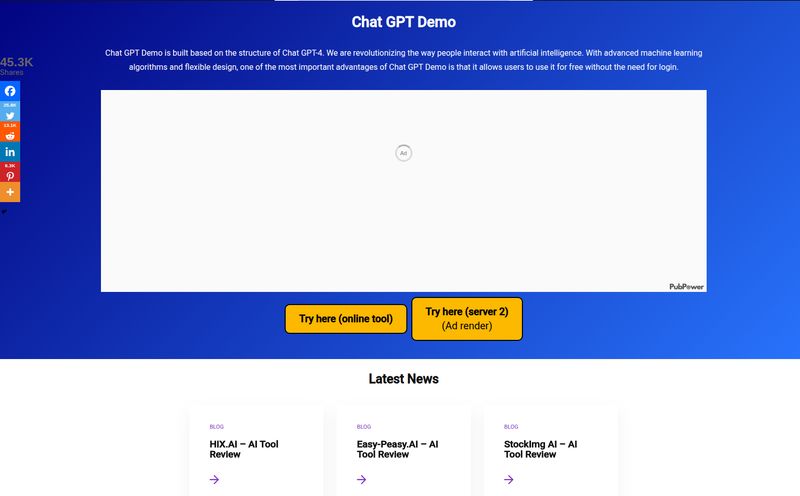The content creation hamster wheel is exhausting. As an SEO, my life is a constant cycle of keyword research, content briefs, writing, editing, and then praying to the Google gods for a spot on page one. For years, we did it all by hand. Then AI writing tools exploded onto the scene, promising to be the magic bullet we all desperately needed.
I’ve tested more of them than I can count. Some are clunky, some are brilliant, and many are just... okay. So when another one, Writeseed, popped up on my radar, I was skeptical but intrigued. It boasts access to heavy hitters like GPT-4o and Claude 3.5 and an 'All-in-one' approach with a slick Chrome extension. But does it actually deliver? Or is it just another shiny object in the ever-growing pile of AI tools?
I took it for a spin. Here’s my no-fluff, honest take on Writeseed from someone who lives and breathes this stuff.
What Exactly is Writeseed? (And Why Should You Care?)
At its core, Writeseed is an AI-powered writing assistant. You’ve heard that before. But it's not just about spitting out a 1,000-word article on a topic. It's designed to be a co-pilot, a writing partner that integrates into your workflow to help you create SEO-friendly content—from blog posts and website copy to Google Ads and social media blurbs—much, much faster.
The big deal here is the engine under the hood. It’s not running on some outdated, no-name model. Writeseed gives you access to the latest and greatest, including GPT-4, GPT-4o, and even Claude 3.5 Sonnet. For those of us in the trenches, that means the quality of the raw output is going to be significantly better than many of its competitors. It’s the difference between getting a half-baked idea and a well-structured draft that just needs your finishing touch.
My Favorite Writeseed Features (The Good Stuff)
A tool is only as good as its features, right? Here’s what stood out to me during my testing.
The Chrome Extension: Your AI Sidekick Everywhere
This is probably the biggest win for Writeseed, in my opinion. I practically live in my browser, jumping between Google Docs, WordPress, Ahrefs, and a dozen other tabs. The Writeseed Chrome extension follows you around, ready to help. It's like having a little AI assistant perched on your shoulder. You can highlight text on any webpage and ask it to summarize, rephrase, or expand on it. Need to bang out a quick email? It can do that right in Gmail. Drafting a blog post in the Wordpress editor? It’s right there with you. It’s this integration that makes it feel less like a separate, clunky tool and more like a natural extension of your brain.
The Template Library: More Than Just a Blank Page
Ah, the dreaded blank page. Writer’s block is real, folks. Writeseed's library of over 70 templates is a fantastic cure. These aren't just for full articles. They have templates for specific sections like 'Blog Intros' or 'Blog Outlines,' plus stuff for PPC ads, product descriptions, and video scripts. It's a great way to kickstart the creative process when you’re just staring at a blinking cursor. You give it a few prompts, it gives you a starting point, and you’re off to the races.

Visit Writeseed
Going Global with Over 35 Languages
If you're doing any kind of international SEO, you know what a pain it can be to produce quality content in multiple languages. Writeseed supports over 35 of them. This is a massive feature for businesses looking to expand their reach without hiring an army of translators for every single piece of content. Of course, you'll still want a native speaker to review it, but for getting a solid, localized draft? It's a game-changer.
Built-in SEO and Image Tools
I was pleasantly surprised to see an SEO Overview feature baked in. It helps you optimize your content as you write, which is a nice touch. And the AI Image Designer is genuinely useful. We all know how important visuals are for engagement, and being able to generate a unique, relevant image right inside the platform saves you a trip (and a subscription fee) to another tool. It's all about streamlining the workflow, and I appreciate that.
Let's Talk Turkey: Writeseed Pricing
Okay, the all-important question: what's it going to cost? The pricing structure is... interesting. They offer both monthly and yearly plans, with different features and limits. Here’s a quick breakdown of their monthly plans as I found them.
| Plan | Monthly Price | Key Features |
|---|---|---|
| Starter | $39 /month | 30,000 words, 1 user, Wordpress Integration, AI Image Designer, 70+ templates. |
| Standard | $24 /month | Unlimited words, 3 users, plus all the features of the Starter plan. |
| Business | $49 /month | Unlimited words, 10 users, plus all the features of the Standard plan. |
Now, you probably noticed the same thing I did. The 'Standard' plan is cheaper than the 'Starter' plan but offers unlimited words and more users. Is this a typo? A temporary promo? I’m not sure, but it’s definitely something to look into on their official pricing page. If that price is accurate, the Standard plan is an incredible deal. They also offer yearly plans that bundle in unlimited words and images and access to the top-tier AI models, but you'll have to check their site for the most current annual pricing.
The Not-So-Shiny Parts: A Reality Check
No tool is perfect. It's my job to be critical, so here are a few things to keep in mind.
The 3.6-Star Elephant in the Room
When I looked at the Chrome Web Store, Writeseed had a 3.6-star rating. Not terrible, but not stellar either. Why? My educated guess is what I call the "magic wand fallacy." A lot of people sign up for AI tools expecting them to be a one-click solution that produces flawless, award-winning content. That’s just not how it works. These tools are assistants, not replacements. If you just copy and paste the output without any editing, you're going to be disappointed. That rating, I suspect, comes from users who haven't yet embraced the human-in-the-loop mindset.
The Human-in-the-Loop Imperative
This brings me to my most important point about Writeseed, and frankly, all AI writers. You still need to be the editor-in-chief. AI is a fantastic sous-chef. It can chop the vegetables, prep the ingredients, and maybe even suggest a recipe. But you, the head chef, need to taste the sauce, add the final seasoning, and plate the dish beautifully. The raw output from Writeseed is a strong starting point, but it needs your expertise, your voice, and your critical eye to make it truly great. Don't ever just copy, paste, and publish. Please. For the good of the internet.
Who is Writeseed Really For?
So, who gets the most out of this tool? In my experience, it's a great fit for a few key groups:
- Solo Bloggers & Small Business Owners: If you're wearing all the hats, Writeseed can be a massive time-saver, helping you maintain a consistent publishing schedule without burning out.
- SEO Agencies & Freelancers: It's fantastic for scaling content production. You can quickly generate drafts for clients, flesh out content briefs, and speed up your entire workflow.
- Marketing Teams: Need to whip up 10 variations of ad copy or a bunch of social media posts? The templates make this kind of rapid-fire creation a breeze.
It's probably not the right tool for a creative writer who treasures the art of crafting every sentence from scratch, or a company that needs highly-technical, PhD-level articles on obscure topics (though it could still help with outlines!).
Final Thoughts From a Jaded SEO
So, what’s the verdict? I've gotta say, I'm pleasantly surprised. Writeseed isn't just another clone in a crowded market. The powerful AI models it uses, combined with the genuinely useful Chrome extension and a solid set of features, make it a strong contender.
It’s not going to write your next masterpiece for you. But it will give you a damn good head start. It’ll help you conquer the blank page, streamline your process, and get more high-quality, optimized content out the door. And in the relentless world of SEO and content marketing, that's more than half the battle.
Frequently Asked Questions (FAQ)
- Is content from Writeseed safe for SEO?
- Yes, as long as you use it correctly. Google's stance, confirmed by folks like John Mueller, is that they reward quality content, regardless of how it's produced. The key is to use Writeseed to create a unique, helpful draft and then edit, fact-check, and add your own expertise. Don't just publish the raw output.
- Can Writeseed completely replace a human writer?
- Nope. Not yet, anyway. It's an assistant, a powerful tool to augment a human writer's skills, not replace them. It lacks genuine creativity, personal experience, and critical thinking. It's best used as a collaborative partner.
- What languages does Writeseed support?
- It supports over 35 languages, making it a powerful option for businesses with a global audience or those running international SEO campaigns.
- Does Writeseed use GPT-4?
- Yes! It uses several advanced models, including GPT-4, GPT-4o, and Claude 3.5 Sonnet, which results in higher-quality output compared to many other tools on the market.
- How does the Writeseed Chrome extension work?
- It integrates AI into your browser, allowing you to summarize web pages, rewrite text, generate emails in Gmail, and even draft content directly within platforms like WordPress, making it incredibly convenient.
- Is there a free trial for Writeseed?
- The pricing information I had didn't specify a free trial, but many SaaS companies do. Your best bet is to check their official website for the most current offers.
Reference and Sources
- Writeseed Official Website & Pricing: https://writeseed.com/
- Writeseed Chrome Extension: Chrome Web Store Listing



